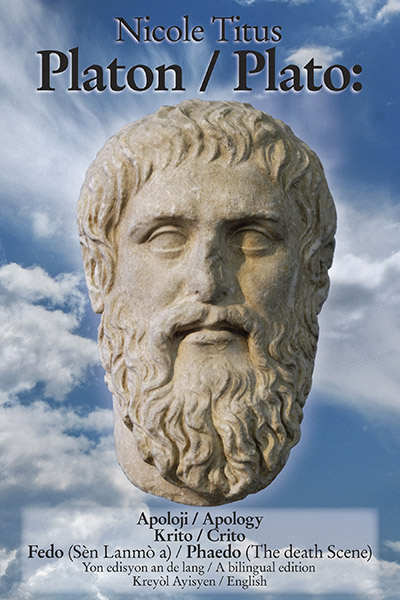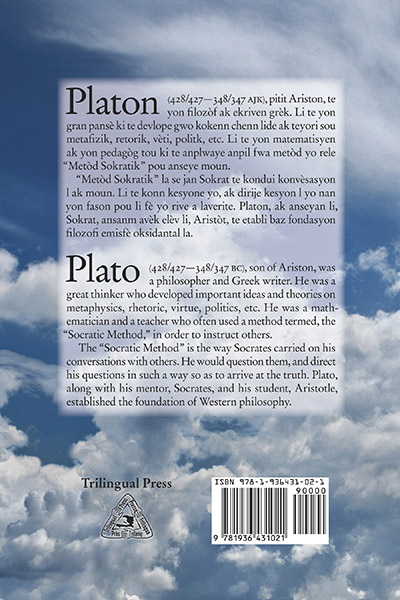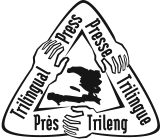
Trilingual Press is pleased to announce the release of Nicole Titus’ Plato: Apology, Crito and Phaedo / Platon: Apoloji, Krito e Fedo [ISBN 13: 978-1-936431-02-1], a translation into Haitian Creole of three works of the Greek philosopher.
For a long time the Haitian Creole language was considered as the exact opposite of the classic, European languages like Greek, Latin, Spanish, English, French, Russian, etc., because the Haitian Francophile elite believes one couldn’t supposedly write anything serious in it, such as philosophy or natural sciences.
Naturally Chomskian generative linguistics, along with modern research on language development and acquisition, have debunked those premises. In fact, what linguistic research has demonstrated is the fact that each human being is born with a biological or generative grammar which helps him/her learn any language that is spoken in the environment where they live. Those researches show how a child who has come from a foreign country or grown up in whatever family, can learn a language that was foreign to him or her without much difficulty or complication. What they further show is the equality of functionality, particularly at the competence level, among languages, be it the classic Greek or the Haitian Creole.
When we place this Nicole Titus’ work, Plato: Apology, Crito and Phaedo / Platon: Apoloji, Krito e Fedo, in the context of the current, on-going project to establish a Haitian Creole Academy in Haiti (where an important international colloquium on the Academy took place, in Port-au-Prince, in October 2011), we feel very happy about the future of the Haitian vernacular.
Like we said in a recent publication, the dominant languages and cultures are not dominant because they declare themselves dominant, they’re dominant because they have schools, universities, libraries, scholarly institutes, publishing houses, medias of mass communication, the power of the State and the Capital to help second their claim.
In the power relation between the Haitian language/culture and the French language/culture, there will not be a balance of power, that is parity in terms of performance and acceptability, if there’s not production in the language and an infrastructure that sustains that production.
It is this determinist logic which prompts Trilingual Press to open the new imprint Kreyòl Ayisyen Klasik. This book by Nicole Titus is the first installment from this furnace, others will follow.
As for Haitian Creole texts in general, our catalogue for the Fall-2012–Spring 2013 season includes a bilingual—English-Haitian—collection of poems by Doumafis Lafontan, Mountain Behind Mountains / Deyè Mòn Gen mòn; a Haitian Creole novel, Adelina, by Ewald Delva (Zòf); a collection of poems in Haitian, Masuife, by Patrick Sylvain, and a collection of literary criticisms in Haitian and French, Memwa Baboukè / La Gueule du trublion, by Tontongi. This book includes profiles of authors such as Jean-Paul Sartre, Paul Laraque, Edwidge Danticat, Danielle Georges, etc.
A remarkable characteristic of all these books is that they are all written in Haitian Creole or are Haitian Creole translation from other languages, and all of them—in together the refined style in which they’re written and the intellectual depth they display—challenge the assertion that claims one cannot write anything serious in Haitian Creole.
Those kind of conceptions are a result of ignorance, like Nicole Titus says in her introduction regarding Plato’s teacher, Socrates, “he believed that everybody, whether literate or, in spite of being illiterate, had the capacity to learn everything, every subject, even concepts of geometry and abstract thoughts.” Knowledge is a gift available to everyone who wants to enrich his/her mind.
Nicole Titus and the authors here mentioned have shown, with evidence to back them up, the beautiful quality of work one can do in Haitian Creole. In short, there’s nothing in the domain of knowledge and emotion—including philosophy and science—one cannot express or translate in Haitian Creole.
We hope the school teachers who want textbooks in Haitian Creole to support their teaching would take advantage of Nicole Titus’ book. The extra gift she gives us is the wonderful elegance as well as the elevation of the language she uses. This is a historic book.
—Tontongi November 2012
Platon an kreyòl ayisyen
Trilingual Press pran plezi pou li anonse piblikasyon nouvo liv Nicole Titus la, Platon: Apoloji, Krito, Fedo / Plato: Apology, Crito, Phaedo [ISBN 13: 978-1-936431-02-1], yon tradiksyon an kreyòl ayisyen twa zèv filozòf grèk la.
Pou lontan yo te konsidere lang kreyòl ayisyen an tankou yon ekzat opoze lang klasik ewopeyen yo kouwè grèk, laten, espayòl, anglè, fransè, rus, elatriye, paske lelit frankofil ayisyen an te fè moun konnen ou pa t ka swadizan ekri bagay serye ladann, bagay serye kouwè filozofi ak syans natirèl.

Natirèlman lengwistik jenerativ Chomsky a ansanm ak lòt rechèch modèn sou devlopman ak akizisyon langaj vin demanti premis sa yo. Anfèt sa rechèch lengwistik vin demontre se lefètke chak moun pran nezans avèk yon gramè byolojik oubyen jenerativ ki ede l aprann nenpòtkèl lang ki pale nan anvironnman l’ap viv la. Rechèch yo montre kouman yon timoun ki sot nan yon peyi etranje oubyen ki elve nan nenpòtkèl fanmi, ka aprann yon lang li te etranje avè l, san difikilte ni konplikasyon. Sa etid sa yo montre anplis, se egalite fonksyonalite, espesyalman onivo konpetans, ant tout lang sou latè, keseswa grèk klasik ouswa kreyòl ayisyen.
Lè nou mete zèv Nicole Titus sa a, Platon: Apoloji, Krito, Fedo / Plato: Apology, Crito, Phaedo, nan kontèks pwojè pou met soupye yon Akademi Kreyòl Ayisyen ann Ayiti (kote yon kokennchenn kolòk entènasyonal sou Akademi an te reyini nan Pòtoprens an oktòb 2011), sa fè kè nou kontan sou lavni lang natifnatal ayisyen an.
Kou nou te di nan yon piblikasyon resamman, lang ak kilti dominan yo pa dominan paske yo deklare tèt yo dominan, yo dominan paske yo gen lekòl, inivèsite, biblotèk, enstiti detid, mezondedisyon, medya kominikasyon demas, pouvwa Leta ak pouvwa Kapital pou ede yo segonde deklarasyon an.
Nan relasyon de pouvwa ant lang/kilti kreyòl ayisyen an ak lang/kilti fransè a, pap gen yon ekilib pouvwa, sètadi yon parite antèm de pèfòmans e aseptabilite, si pa gen pwodiksyon nan lang an, e sipa gen enfrastrikti ki la pou ede pwodiksyon an.
Se lojik detèminis sa a ki pran tèt Trilingual Press—oubyen Près Trileng—e ki fè li louvri yon sikisal literè ki rele Kreyòl Ayisyen Klasik, k’ap tradui an kreyòl ayisyen zèv literati mondyal klasik yo. Zèv Nicole Titus sila a se premye plato ki sot nan founo nou, lòt ap vin suiv. Pou piblikasyon tèks kreyòl an jeneral, katalòg nou pou sezon otònn 2012–ivè 2013 yo gen ladann yon koleksyon powèm bileng—Anglè-Ayisyen—pa Doumafis Lafontan, Mountain Behind Mountains / Deyè Mòn Gen mòn; yon woman an kreyòl ayisyen pa Ewald Delva (Zòf), Adelina; yon koleksyon powèm ann ayisyen pa Patrick Sylvain, Masuife, ak yon koleksyon kritik literè ann ayisyen, Memwa Baboukèt / La Gueule du trublion, pa Tontongi. Liv sa a se yon konpilasyon pwofil, ann ayisyen e an fransè, sou plizyè ekriven ayisyen e etranje kouwè Jean-Paul Sartre, Paul Laraque, Edwidge Danticat, Danielle Georges, etc.
Youn nan karakteristik remakad zèv sa yo, sèke yo tout ekri nan lang kreyòl ayisyen an oubyen an edisyon bileng, e yo tout—nan alafwa estil rafine otè yo ekri yo e kalite ak pwofondè entelektyèl yo layite—leve defi ki di yon moun pa ka ekri anyen serye an kreyòl ayisyen.
Se iyorans ki fè moun nouri tip de konsepsyon sa yo, men kouwè Nicole Titus di nan entwodiksyon sou pwofesè Platon, Sokrat: “Sokrat te kwè tout moun, kit yo konn li oswa, malgre yo pa konn li, te gen kapasite pou yo konprann tout bagay, tout sijè, menm konsèp jeometri ak bagay ki abstrè.” Konesans se yon kado ki disponid alapòte tout moun ki vle anrichi lespri li.
Nicole Titus, ansanm ak lòt otè nou mansyone la yo, montre prèvalamen, bèl kalite travay ou ka fè nan lang ayisyen an. Anbrèf, pa gen anyen nan domèn konesans ak emosyon—san wetire filozofi ak lasyans—yon moun pa ka esprime oubyen tradui an kreyòl ayisyen.
Nou espere pwofesè lekòl yo ki bezwen materyèl an kreyòl ayisyen pou apuiye ansèyman yo ap pran avantaj de zèv Nicole Titus sila a. Kado li ba nou anplis, se elegans bèl talatàn ansanm ak elevasyon langaj li anplwaye a. Se yon zèv istorik.
